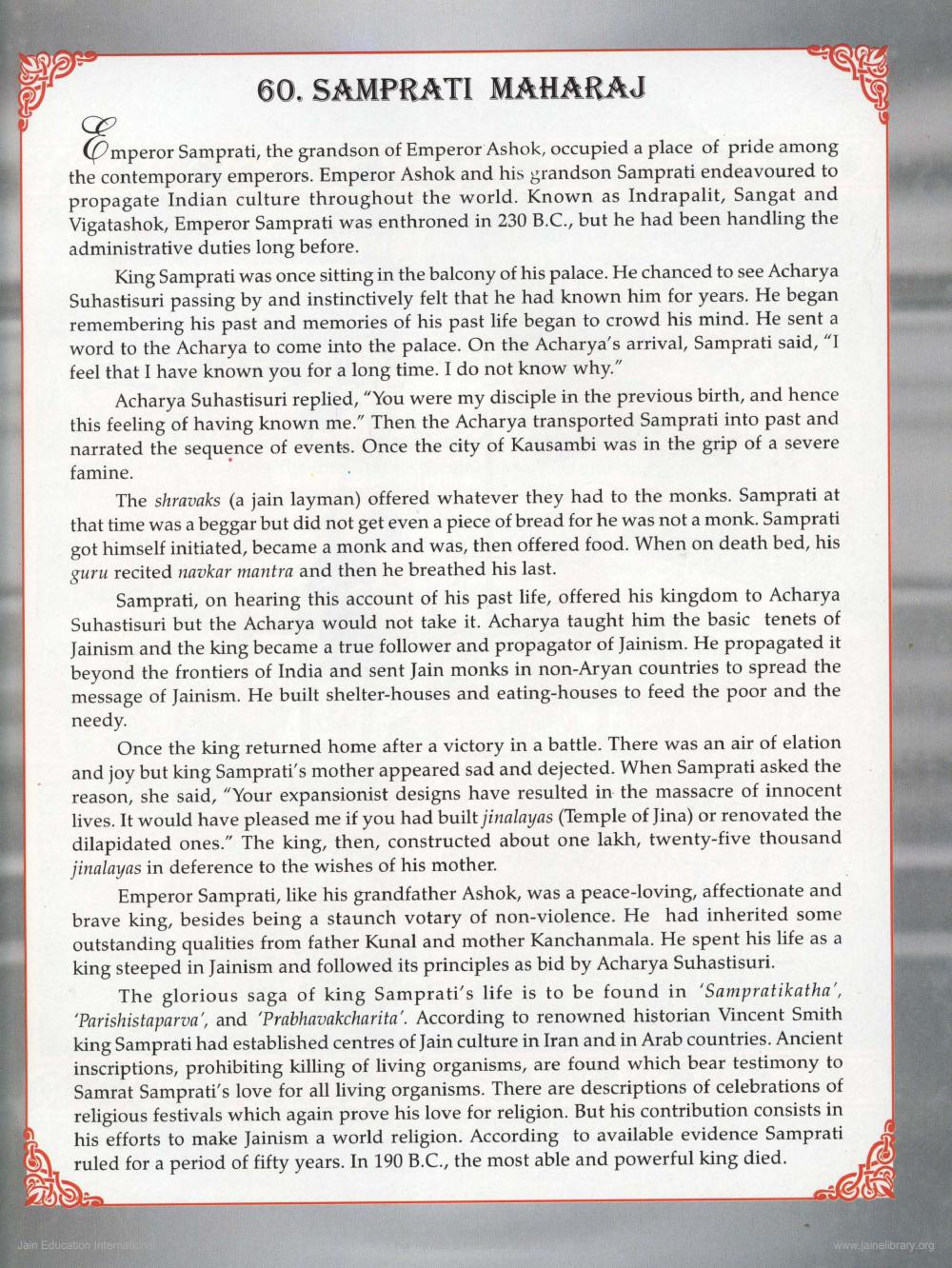________________
60. SAMPRATI MAHARAJ
Omperor Samprati, the grandson of Emperor Ashok, occupied a place of pride among the contemporary emperors. Emperor Ashok and his grandson Samprati endeavoured to propagate Indian culture throughout the world. Known as Indrapalit, Sangat and Vigatashok, Emperor Samprati was enthroned in 230 B.C., but he had been handling the administrative duties long before.
King Samprati was once sitting in the balcony of his palace. He chanced to see Acharya Suhastisuri passing by and instinctively felt that he had known him for years. He began remembering his past and memories of his past life began to crowd his mind. He sent a word to the Acharya to come into the palace. On the Acharya's arrival, Samprati said, “I feel that I have known you for a long time. I do not know why."
Acharya Suhastisuri replied, "You were my disciple in the previous birth, and hence this feeling of having known me." Then the Acharya transported Samprati into past and narrated the sequence of events. Once the city of Kausambi was in the grip of a severe famine.
The shravaks (a jain layman) offered whatever they had to the monks. Samprati at that time was a beggar but did not get even a piece of bread for he was not a monk. Samprati got himself initiated, became a monk and was, then offered food. When on death bed, his guru recited navkar mantra and then he breathed his last.
Samprati, on hearing this account of his past life, offered his kingdom to Acharya Suhastisuri but the Acharya would not take it. Acharya taught him the basic tenets of Jainism and the king became a true follower and propagator of Jainism. He propagated it beyond the frontiers of India and sent Jain monks in non-Aryan countries to spread the message of Jainism. He built shelter-houses and eating-houses to feed the poor and the needy.
Once the king returned home after a victory in a battle. There was an air of elation and joy but king Samprati's mother appeared sad and dejected. When Samprati asked the reason, she said, "Your expansionist designs have resulted in the massacre of innocent lives. It would have pleased me if you had built jinalayas (Temple of Jina) or renovated the dilapidated ones." The king, then, constructed about one lakh, twenty-five thousand jinalayas in deference to the wishes of his mother.
Emperor Samprati, like his grandfather Ashok, was a peace-loving, affectionate and brave king, besides being a staunch votary of non-violence. He had inherited some outstanding qualities from father Kunal and mother Kanchanmala. He spent his life as a king steeped in Jainism and followed its principles as bid by Acharya Suhastisuri.
The glorious saga of king Samprati's life is to be found in 'Sampratikatha', 'Parishistaparva', and 'Prabhavakcharita'. According to renowned historian Vincent Smith king Samprati had established centres of Jain culture in Iran and in Arab countries. Ancient inscriptions, prohibiting killing of living organisms, are found which bear testimony to Samrat Samprati's love for all living organisms. There are descriptions of celebrations of religious festivals which again prove his love for religion. But his contribution consists in his efforts to make Jainism a world religion. According to available evidence Samprati ruled for a period of fifty years. In 190 B.C., the most able and powerful king died.
29:
Jain Education Interno
www.jainelibrary.org




